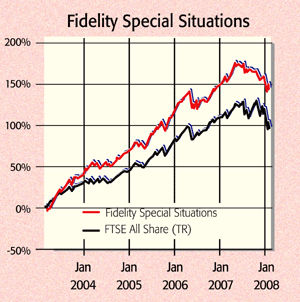
Looking down Bestinvest’s “most dumped funds of 2007” list, it’s little surprise to find Fidelity’s Special Situations and Global Special Situations Funds vying for the top spot. Once run as a single fund by star manager Anthony Bolton, his retirement from hands-on control led to the split into two separate funds, one UK-focused, the other with a global remit.
His exit also triggered an almost inevitable outflow of money. The UK fund saw a £345m net outflow in 2007, the global one £575m. That’s not to detract from the merits of either of Bolton’s successors, Sanjeev Shah and Jorma Kohonen. But what it makes clear is that investors bought the Fidelity Special Situations Fund because it was run by Bolton, who returned 312% in the ten years to June 2006, rather than the fact that they liked the investment philosophy behind the fund itself.
Yet the promise behind a special situations fund looks rather appealing, particularly in today’s volatile markets. The basic idea is that these funds recognise hidden value in specific stocks that other managers haven’t yet unearthed. This could mean looking for firms trading below asset value, those that look unreasonably cheap compared to their rivals and those due a turnaround after several years of dismal performance.
With stock prices plunging across the globe, the idea of a fund that can trawl the wreckage for bargains is attractive. But having taken a look at 15 UK equity funds that carry the tag, researcher Morningstar found that they varied widely in their approach, and in their hunting grounds – so potential investors need to be picky.
Exposure to large caps ranged from 72% for the Jupiter UK Special Situations Fund to 2.7% for the Smith & Williamson UK Special Situations Fund. Jupiter is up 105.4% over five years, but with its top five holdings consisting of FTSE 100 stalwarts Vodafone, Shell, HSBC, GlaxoSmithKline and Reed Elsevier, it could hardly be described as delving deep in its hunt for bargains.
Fidelity Special Situations, despite its strong performance, isn’t much more adventurous, with Vodafone again among its top ten holdings. It looks as though the investors dumping the fund have the right idea. Without a manager of Bolton’s proven calibre, the reality is that these ‘contrarian’ funds are no more likely to outperform the market than any other fund. If you really want exposure to Vodafone and Shell, buy a cheap FTSE 100 tracker – but if you really want to make a contrarian bet, we’d be looking to buy into Japan.